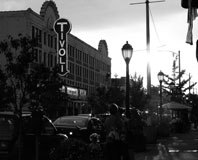
Memory is a blue stone
Memory is a house
Memory is a green lawn
set in a silver heart
I admire, turning
the pendant from side
to side with my fingers.
I’m a little over eight months
pregnant, wanting
but not wanting to be in the shop,
to walk along and look at shiny
things. Something strikes me
as wrong. I tell my husband
to wait for me
and in a bathroom stall
see spots of blood
staining the white
fabric of my underwear.
My face flushes with fear.
I cannot hurry
without cramping,
and walk at a safe, slow gait
to where my husband waits.
When he sees my face
he pays for the necklace
and we leave, my arm
in his, the small plastic bag
dangling from my hand,
the stone resting inside
like a small weight.
gone soft at the corners.
My mother is young
and unwed, cradling an infant
she cannot keep. She stares
into her daughter’s large blue eyes
and speaks a name, Hope,
that will echo across decades.
A nurse arrives in a starched uniform
and extends her sterile hands for the child.
My mother leaves her bed,
walks to the doorway,
then down a long hall.
At the end of the corridor,
a door. She turns a knob and steps
into daylight. The sidewalk
is lined with wilting petunias.
Down the street, someone calls her name.
where my grandfather and his twin
squeak their new shoes in unison.
Squeak squeak
as they walk across the grass
toward the men testing the temperature
of a barrel of scalding water
buried up to its lip.
“Stay away from here,”
warns an uncle.
Squeak squeak
reply the shoes.
A shot rings across the yard.
Their shoes squeak
around the house,
past the trees.
They are three years old
and the world is a carnival.
There is no danger.
They run back to where the men stand
waiting for the hog to bleed.
The shoes squeak louder and faster.
The men shout for them to stop
but their voices cannot stop his sister
from tripping and plunging into the barrel.
An arm quickly pulls her out—
their father cuts the dress from her skin—
an uncle fills a barrel with cold water—
one man runs to the neighbor’s house
to call a doctor—
Mother rushes from the house, shouting—
soon, her body soaks in cold water—
soon, a doctor brings salves to soothe
her red and blistering skin.
She lies on a bed in a dark room,
motionless and breathing rapidly,
her mother sitting bedside, praying
and replacing warm compresses with cold.
His sister does not stir or speak.
Past this moment she will become
an echo of shoes squeaking
beyond a grave.
Julie Brooks Barbour is the author of the chapbook Come To Me and Drink (Finishing Line Press, 2012). Her poems have appeared in Waccamaw, Kestrel, Referential Magazine, damselfly press, Taos Journal of Poetry & Art, Prime Number Magazine, diode, and on Verse Daily. She teaches at Lake Superior State University where she edits the journal Border Crossing.

